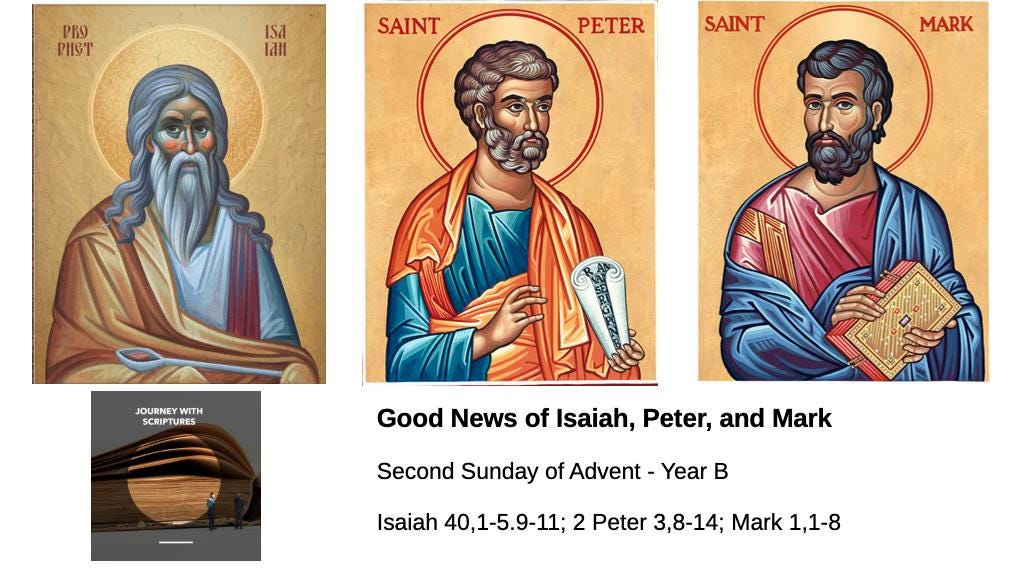Isaiah 40,1-5.9-11; 2 Peter 3,8-14; Mark 1,1-8
When the Jewish people were forced to leave Jerusalem for Babylon in 597 BC, they faced uncertainty about their return. Some false prophets claimed they'd be back within two years (Jer. 28:3-4). However, their exile endured much longer than anticipated - over 70 years, just as Jeremiah had predicted (Jer. 25:11). Throughout this extended period, the descendants of these exiles settled into their new lives in Babylon. They got married, raised families, tended to gardens, and prayed for Babylon's well-being (Jer. 29:5-7). It was during this time that the "gospel of Isaiah," which we read today, reached them. This gospel brought the hopeful message that they could eventually return to the land their parents had been compelled to leave; their time of penance and exile was finally over.
The Gospel according to Mark opens with a statement: "The beginning of the gospel of Jesus Christ, the Son of God" (Mark 1:1). Mark does not have the stories about Jesus' miraculous conception and his humble birth (see Matt. 1-2; Luke 1-2). He begins his narrative with the arrival of John the Baptist, announcing the possibility of returning to God. Yet it is not just what John says that is important but also where he says it. The desert symbolises freedom, while the Jordan River serves as the gateway to the promised land (Joshua 3:1-17). Through John, God once more invites His people into the wilderness to speak to their hearts (Hosea 2:16). In the next act of Mark’s Gospel, Jesus Christ would enter the stage offering the transforming power of baptism with the Holy Spirit.
The second reading speaks to those who have already gone through a spiritual transformation with the Holy Spirit's baptism. They've received the grace of faith from the risen and glorified Jesus. Now, they eagerly anticipate and sometimes even try to speed up the final part of the story - the time when everything will be made new, and everything will be right with the world (2 Peter 3:13).
But why does not Jesus come back right away? Apostle Peter explains that what might seem like Jesus taking a long time is not a delay from God's perspective. Time works differently for God. And the reason Jesus has not returned to judge everyone yet is because God is incredibly merciful. He does not want anyone to be lost but wants everyone to have the chance to change their ways and turn back to Him (2 Peter 3:9).
The central theme of the liturgy of the Word is "Good News" about the possibility of "homecoming". We've been stuck in the exile of wrongdoing for too long. We've forgotten who we are as Christians and have started to doubt the promises God made to us. Isaiah brings the news that our slavery to sin is over. John the Baptist reminds us of our great history, those moments when we felt God's care and knew that nothing was too hard for Him. Saint Peter directs our focus to what is coming ahead - “new heavens and a new earth in which righteousness dwells” (2 Pet. 3:13).
Let us embrace this Good News, reclaim our Christian identity, and rekindle our faith in the unfaltering promises of God. Let us journey forward with hearts awakened, anticipating the dawn of that day when all will be made new.




